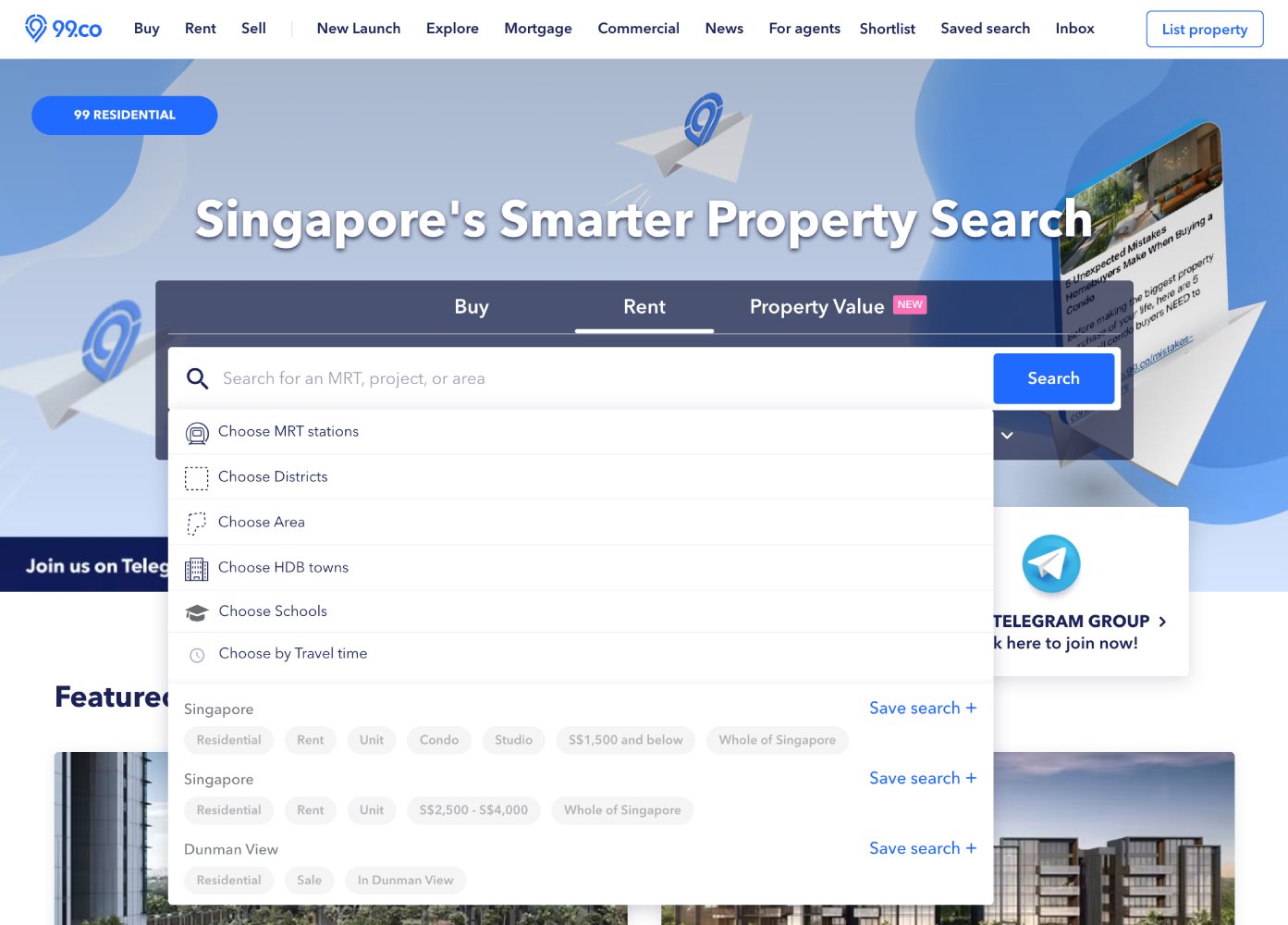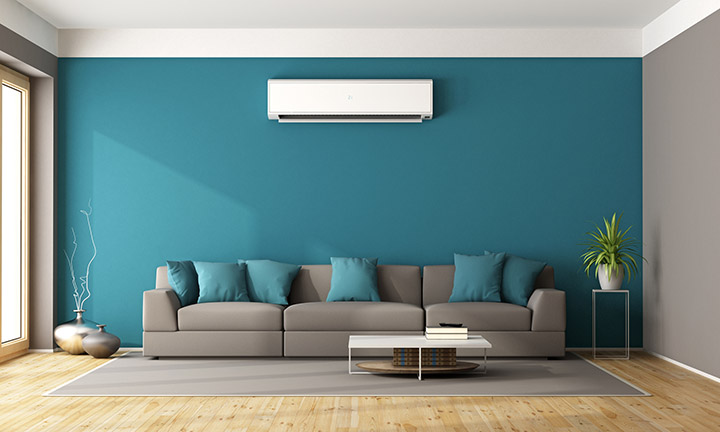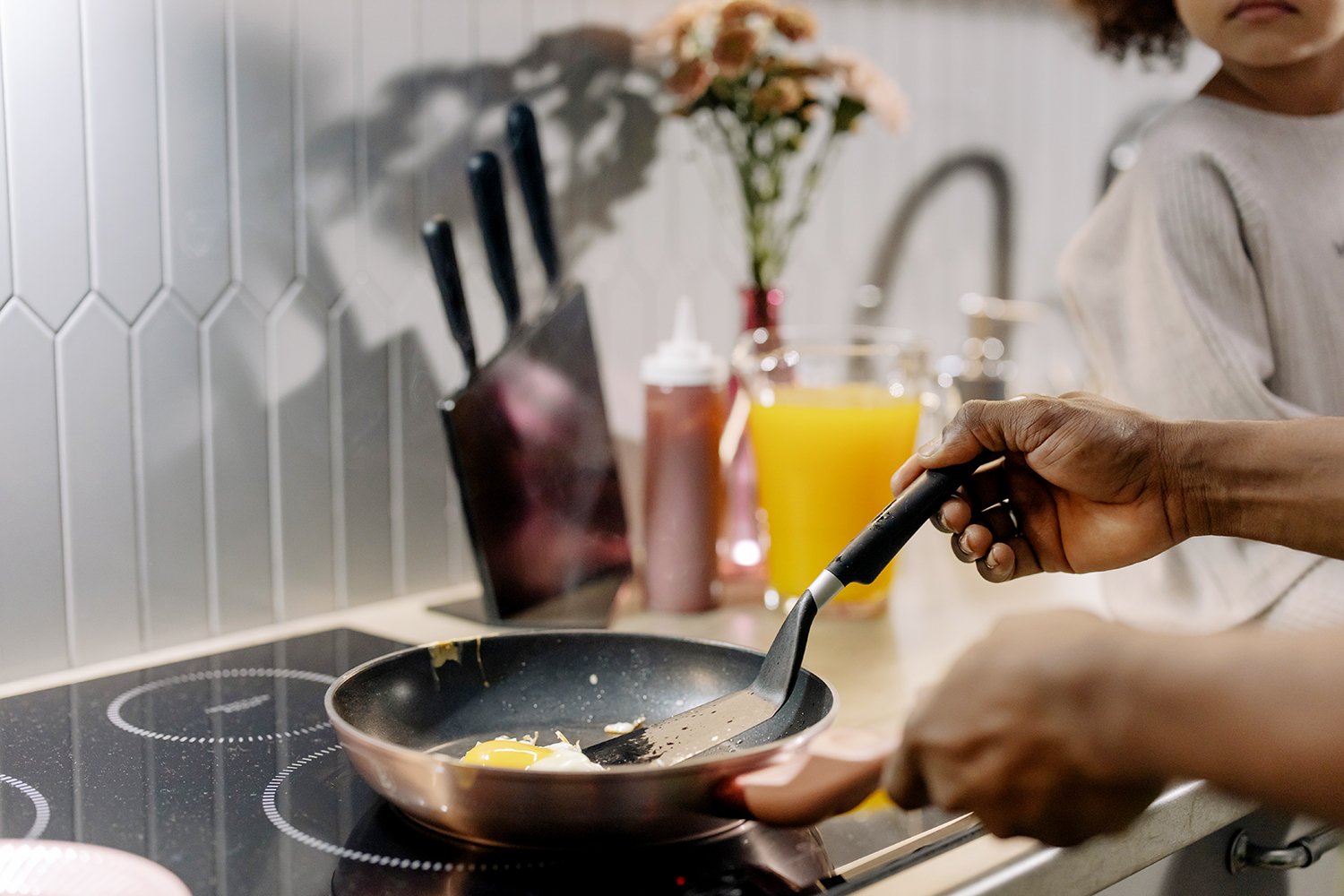Congratulations! So you’ve decided to take the step to live in your own space by renting an apartment. Renting can be pretty daunting if you don’t have the first clue about what to look out for as a newly minted tenant.
Fret not; we’ve put together 10 important questions for you to ask your agent or landlord.
Tap on 99.co to access the hundreds of properties available at your fingertips and use the powerful filter tool to find the perfect unit for you.

1. Is the apartment furnished?
When viewing potential apartments, be aware that they may have been staged to increase interest and secure a higher rent.
Usually, it states on the property listing if the apartment comes furnished or unfurnished. Ask the landlord which furniture or appliances will come with the rental and which they may be removing.
This is to prevent unexpected costs from having to buy a new mattress, fridge or other furnishings when you move in.
2. Does the apartment allow pets?
Some landlords have a clause in the lease that strictly forbids pets of all kinds. However, there’s no harm in asking, especially if Fido is an indispensable part of your family.
Some are willing to make exceptions for smaller breeds who don’t bark or cause disruptions to the neighbours. However, they will draw a hard line if you’re moving in with your lovable but clumsy Golden Retriever in tow.
3. What happens if I need to break the lease?
Sometimes unforeseen circumstances may pop up in your life, such as a financial setback, which forces you to terminate your lease early.
Do reach out to the property agent in charge of your rental and seek to come to a mutual agreement. Usually, breaking a lease means accepting the penalty of forfeiting your security deposit. A deposit is handed over when you sign the tenancy agreement. This is one or more months worth of rental fees and can amount to thousands of dollars.
Your landlord might demand additional compensation, such as paying the rest of the rent for the remainder of your lease.

Speaking from personal experience, when I broke the lease of my rental unit, I proposed seeking another tenant to either take over the remainder of my lease or sign a fresh lease with the landlord. Thankfully, my landlord was agreeable, and I was able to terminate my lease a year into my tenancy without incurring any losses.
If you think you might relocate overseas for work, make sure to incorporate a Diplomatic and Reimbursement Clause into your tenancy agreement from the get-go. This clause allows you to terminate your lease, subject to a minimum notice period.
4. What happens if I need to extend the lease?
On the flip side, you might grow to love the rental unit or the neighbourhood so much that you want to extend the lease.
However, you may not be able to continue at the same rate. With rental prices increasing across the board for all districts, be prepared for your landlord to renegotiate and increase your rent as well. After factoring in the costs associated with relocation, this may not necessarily be a bad thing, such as spending time and money packing and moving.
Your landlord may also have other plans for their unit at the end of your lease, such as selling it or moving back in. Make sure to clarify with them if they have an ideal duration in mind before you make long-term plans.
5. Who’s the ideal tenant?
Asking this question helps you determine what the landlord is looking for. Some prefer individuals over families, whereas others have no preference whatsoever.

If they sound discriminatory, it’s a definite red flag, and you may want to steer clear of the property.
In the same vein, you should enquire about the guest policy. Some landlords may have an issue if your friends or partner comes over too much – and exactly how much is too much?
6. Does rental cover internet and utility bills?
Most people are caught off guard the first time they move into their rental home after realising they need to set up their own internet.
Some landlords prefer to have you set it up in your name, so you make payment to the respective companies. To set up the fibre port in your new home, you have to pay the NetLink Trust (NLT) Service Activation fee of S$56.71.
Other landlords keep the utilities in their name and add the cost to your monthly rent.
7. What about maintenance and repair costs?
As a tenant, you are expected to maintain the aircon by servicing it once every 3 months, even if you don’t use it at all. You will find this as one of the clauses in the agreement. Personally, I find signing an annual package cheaper compared to going through the hassle of finding a company to conduct a one-off servicing every time.

Make sure you file the receipts of every servicing and keep it as you will need to hand it over at the end of your lease.
Another standard clause will be the damage and repairs clause, which details how much you’ll have to pay if something requires repairing. It usually ranges from S$150 to S$250, and your landlord will absorb the rest of it.
To avoid being liable for damages you didn’t cause, make sure you check every area of the apartment thoroughly. This includes turning on the taps, flushing the toilets, opening and closing door and cabinet hinges, and checking that all electrical sockets are in working condition.
You’ll usually have a grace period of up to 30 days to examine the apartment and ensure that there are no issues with it. If you can’t find it in your contract, be sure to ask the agent to put it in.
8. What’s the parking situation?
Depending on the type of property you decide to rent, the carpark availability may vary. Most condos grant their residents one carpark lot per unit but may charge from the second car.
After the Land Transport Authority (LTA) introduced the Range-based Provision Standards (RPPS) on 1 February 2019, new condos have phased out visitor parking lots.
With the cap on parking space, be prepared to find alternative parking for your visitors. Or, if you and your spouse or roommate both drive, consider renting an older condo where there’ll be an excess of carpark lots to use.
9. Are there any restrictions?
Some landlords are fussy when it comes to their tenants using the kitchen or common areas of the house. They may specify in the listing that “light cooking” is preferred or ban cooking outright, because home-cooked meals are so passé.

Clarify with the landlord what exactly “light cooking” means. Are you allowed to fry an egg? Two eggs? Can you even so much as glance at the stove? Does this mean you’re doomed to spend your entire lease racking up crazy food delivery charges and being best buddies with the food delivery person?

If you’re a bonafide Masterchef and love whipping up masterpieces in the kitchen, make sure you get an apartment that gives you complete autonomy in the kitchen.
Other restrictions may include the usage of the common areas, such as the living room if you are renting alongside other tenants.
10. What is expected of you when handing the unit back at the end of your lease?
It goes without saying that you should return the unit in the same condition you got it in. That means patching up any holes in the wall if you’ve put up frames or making sure the apartment is spotless. However, there are other things you may need to take note of, such as unexpected cleaning bills.
When I rented an apartment for the first time, my landlord sprung a curtain cleaning charge on me at the end of my lease that wasn’t included in the contract.
Back then, I was new to renting, and she threatened to withhold my safety deposit if I didn’t pay the cleaning charge of almost S$600, so I relented and absorbed the cost.
They were thick, heavy curtains that had to be sent for specialised dry cleaning. In hindsight, I should have insisted on sticking to the contract, which did not specify that I had to clean the curtains before moving out.
I still didn’t learn my lesson in my second apartment, when the landlord demanded I pay for a fresh paint job for the entire house after moving out. It was a two-storey penthouse unit, which meant paying extra for specialised painters who could do a good job painting high ceilings.
However, I stuck to my guns, and I ended up splitting the cost of the painting with my landlord.
Learn from my mistakes and make sure everything is detailed in your contract. Some landlords can be unscrupulous and look for any excuse to forfeit your deposit. I even had one threaten to take half my deposit for… get this: Not changing one lightbulb that had blown on my last day of moving out.
One pro tip is to detail every single existing damage before moving in, right down to the slightest crack, stain, dent or chip. Put them in a file and email it to yourself and your landlord (and agent) to establish the date of proof. Photo and video evidence is irrefutable if your landlord tries to pin any existing damage on you.
Conclusion
Remember that verbal agreements aren’t the same as written ones. If any changes need to be made, make sure to have it in writing and signed by you and your landlord.
Be upfront and discuss both of your expectations in specific detail and document it in the lease. As with any official document, always read it thoroughly and clarify any doubts before signing.
While this list isn’t a comprehensive guide on the questions to ask as a tenant before moving in, we hope it gives you a better sense of what to look out for.
Are you a first-time renter? Let us know in the comments section below or on our Facebook post.
If you found this article helpful, check out Rental viewing checklist for the savvy tenant and 5 ways to score the rental apartment of your dreams at a cheaper price.
Looking for a property? Find the home of your dreams today on Singapore’s fastest-growing property portal 99.co! If you would like to estimate the potential value of your property, check out 99.co’s Property Value Tool for free. Also, don’t forget to join our Facebook community page or Telegram chat group! Meanwhile, if you have an interesting property-related story to share with us, drop us a message here — and we’ll review it and get back to you.
The post Ask these 10 questions when renting in Singapore appeared first on 99.co.

